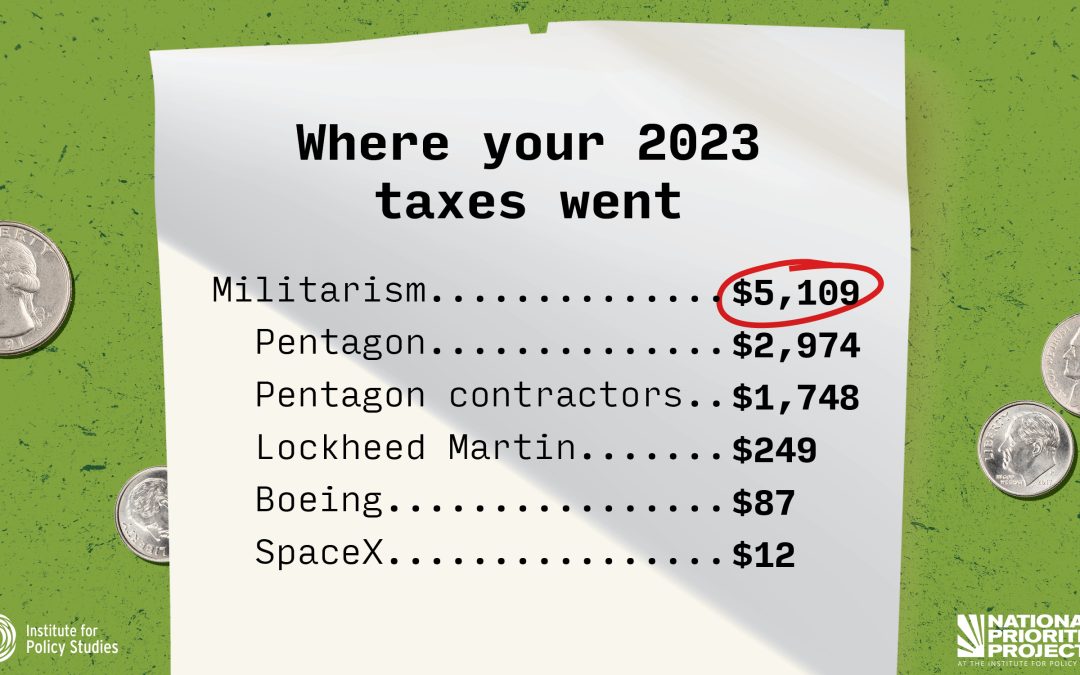
We’re Hemorrhaging Jobs From the “War Wound” of Defense Spending
The solution to our economic crisis lies in drastically reducing our military budget.

The solution to our economic crisis lies in drastically reducing our military budget.
At the historic One Nation Working Together march, activists made the connection between unemployment and our outsize military budget.
We should cut the military budget and use that money to fund our transition to a greener economy.
The right-wing journal Human Events recently wrote that "Obama is a shadow puppet for the Institute for Policy Studies." Flattering and a bit of a stretch. Yet IPS is at the center of the key policy debates taking place in and around the Obama administration on the economic meltdown, on responsible exits from Iraq and Afghanistan, on the environment and many other issues of national consequence.
John Cavanagh and Sarah Anderson have led the Institute in its work to make the economic stimulus bigger and greener, cap CEO pay, fund the arts, address extreme wealth concentration, cut the military budget, and start a larger debate about non-military solutions in Afghanistan. Both are also key liaisons with the 77-member Congressional Progressive Caucus.
As cable talking heads fixate on the partisan posturing in Washington, IPS is seizing this unprecedented opportunity for progressives to forge inside strategies with the Obama administration and the new Congress. At the same time, IPS leaders know organizing from the outside will be indispensable to victories on health care, worker rights, tax justice, foreign policy and many other issues. IPS is helping progressives understand and coalesce around bold strategies for this new time. It is a time ripe with opportunity, a moment in history when fundamental societal shifts can be realized.
This is a ticketed event. You can purchase tickets here.
How the Pentagon can cut the military budget and still keep us safe.

The bulk of the enormous U.S. military budget is earmarked not for fighting terrorism but for the next cold war.

Columnist Frida Berrigan wonders, what ever happened to peace, love, and cutting the U.S. military budget?
Trying to beat the Republicans at their own game–fear-mongering in the service of ever higher military budgets–is a losing proposition.
President Bushs military budget increase and the war time unity on Capitol Hill have created an environment in which weapons makers can enjoy the best of both worldscontinuing to make money on the weapons systems of the cold war while reaping the benefits of a war time bonanza of new defense contracts.
If one adds up all the costs of war beyond the $355.5 billion military budget, the U.S. spends in excess of $465 billion each year for defense, or $1.2 billion a day.
A year and one-half into his tenure and on the brink of pushing the military budget over $400 billion per year, Secretary of Defense Donald Rumsfeld has finally decided to cancel a major weapons program in the name of military “transformation.”

Phyllis Bennis discusses how to win a cease-fire in Gaza, prevent a nuclear war, and shift U.S. policy and funds away from imperialist wars.

The average taxpayer subsidized $1,748 toward Pentagon contractors.

The average taxpayer was forced to subsidize military contractors at the expense of human needs. Here’s an item by item look.

Millions of innocent Gazans are in danger. Half are children who’ve lived through five wars already.